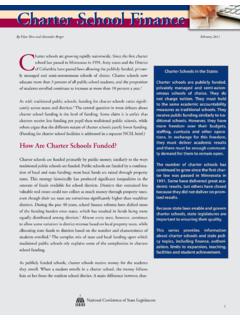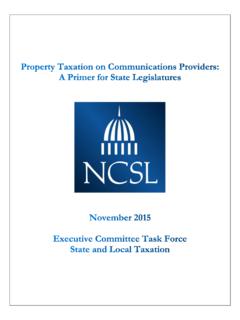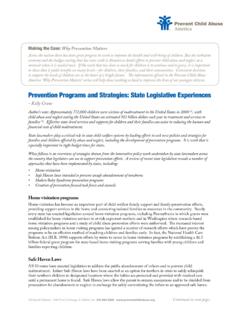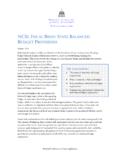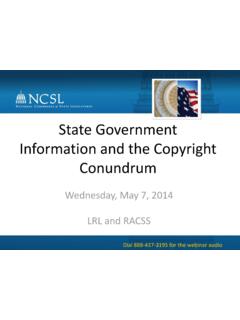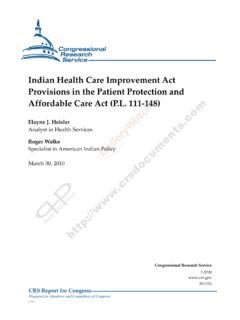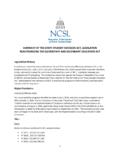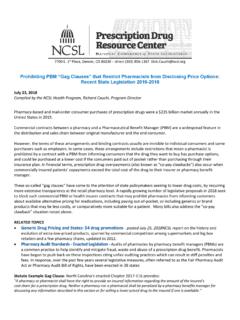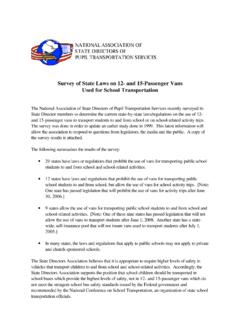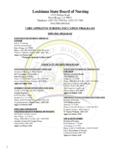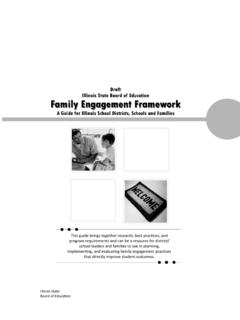Transcription of Authorizing Charter SchoolsAuthorizing Charter Schools
1 1 national conference of State LegislaturesNational conference of State LegislaturesBy Yilan Shen May 2011 Authorizing Charter SchoolsAuthorizing Charter SchoolsAfter two decades of experience with Charter Schools , state legislators want to ensure these Schools are effective. Recent legislation deals more with expansion and quality than early Charter school legislation The pro-cess of Authorizing Charter Schools addresses both the number of Schools to be allowed and the quality of the Schools . Thus, the topic of Authorizing is relevant and important to current debates. Authorizing is the process of approving an ap-plication for a Charter , negotiating a contract, overseeing a school and deciding whether to close a school at the end of its Charter or renew its contract.
2 State laws dictate which entities have Authorizing powers and the roles they play in holding Charter Schools accountable for effectiveness. Rigorous Authorizing is critical to ensuring high-quality Charter Schools . State leg-islators pass laws about Charter school operations and are publicly accountable for ensuring quality. The authorizers, however, directly hold charters accountable for results. Authorizers not only allow promising applicants to open Schools , but also close ineffective Schools . When Charter laws were first enacted, school districts were the main authorizers. Later, states allowed other types of organizations to become authorizers in order to allow growth of Charter Schools , create competition and ensure quality authoriz-ing.
3 Quantity alone, however, did not have the intended effect on quality. Now, stakeholders are focusing on quality in legislation and practices. This brief covers what authorizers do, identifies who authorizers are, discusses state Authorizing policies and offers policy questions for Do Authorizers Do?The four primary responsibilities of authorizers are to review applications for charters, establish charters or contracts, ensure compliance and renew contracts (or not).ApplicationsThe first step in Charter school Authorizing is typically a call for applications. Some authorizers post periodic formal requests for proposals, and others reply to applications as they are At a minimum, applications usually include the following components, although many state laws include more: the mission of the proposed Charter ; financial plans for budgets and facilities; specific educational goals, such as graduation rates and test score benchmarks; involvement of for-profit or nonprofit management organizations; and other information relevant to the capacity of the Charter school to succeed.
4 Charter Schools in the StatesCharter Schools are publicly funded, private-ly managed and semi-autonomous Schools of choice. They do not charge tuition. They must hold to the same academic account-ability measures as traditional Schools . They receive public funding similarly to tradition-al Schools . However, they have more free-dom over their budgets, staffing, curricula and other operations. In exchange for this freedom, they must deliver academic results and there must be enough community de-mand for them to remain open. The number of Charter Schools has contin-ued to grow since the first Charter law was passed in Minnesota in 1991. Some have delivered great academic results, but others have closed because they did not deliver on promised results.
5 Because state laws enable and govern char-ter Schools , state legislatures are important to ensuring their quality. This series provides information about char-ter Schools and state policy topics, including finance, authorization, limits to expansion, teaching, facilities and student conference of State Legislatures2 Some authorizers use outside experts to review applications, while others rely only on internal staff to review. Personal interviews with applicants commonly are held. Using both internal and external evaluators and personal interviews are recommended by the national Association of Charter school Authorizers (NACSA) as part of their Principles and Standards for Quality Charter school Authorizing .
6 The overall rate of Charter approvals has decreased in recent years. The decline could be because authorizers have more experience and are using more rigorous criteria. Since some states have limited the number of charters that can be ap-proved, the decline also could be due to the fact that some have reached or are nearing their applications are approved, the authorizer drafts a con-tract with operators of the proposed school . The contract or Charter outlines the timeline of the agreement, require-ments for a governing board and bylaws, exemptions to traditional school legal obligations, performance goals, the number of Schools allowed under the Charter , fiscal goals and reporting requirements among other Most au-thorizers enter into formal contracts with Charter Schools , unless state law does not require When there is no for-mal contract, the authorizer and school rely on the Charter application and legal precedent to bind the relationship.
7 For example, the authorizer would use the specific educa-tional goals outlined in the application such as student test scores to assess how well the school is meeting its obliga-tions. The span of a contract can be between one and 15 Alaska, Arizona, Georgia, Illinois, Michigan, Mis-souri, Nevada, New Mexico and the District of Columbia allow Charter contracts to be longer than five OversightDuring the contract period, the authorizers continue to monitor the school s progress and compliance. They oversee specific items such as enrollment, academic achievement, student admissions, finances and compliance with regula-tions. Authorizers carry out oversight through financial audits, academic reports, site visits to Schools , monitoring through electronic data systems and reviews by government agencies.
8 Once the oversight tasks are completed, specific actions are taken to address any problems. Authorizer in-volvement varies when a school is not meeting its goals. The school is typically informed about failures in writing and required to develop specific plans for improvement. Some authorizers dictate how the failures should be addressed and the specific changes that are to be Flexibility is an important aspect of Charter Schools autonomy and defini-tion. At this stage, authorizers must be specific about nec-essary improvements without prescribing specific solutions. These reviews can occur prior to or at the end of the Charter term (period of operation written into the Charter ), typically five While some authorizers have the discretion to determine term length, others are bound by state laws.
9 RenewalThe last step in the Authorizing process is a renewal decision. When a Charter school does not meet the goals in its con-tract, it typically would close when its Charter term A Charter school can be closed before the end of the Charter term, however, if the authorizer revokes the Charter or the school operators withdraw the Charter . Most closures occur when the Charter term ends. Common reasons for Charter school closures include financial problems, low academic performance and lack of regulatory compliance. The rate of closures has increased as the number of Charter Schools has expanded. Most closures are concentrated in a few states California, Florida, Ohio, Arizona and Wisconsin but, with the exception of Arizona, they also have the most new school openings.
10 Closure rates in other states vary; some states have never closed a Charter Are Authorizers? states allow various entities to authorize Charter Schools . The most common are local school districts, which account for about 90 percent of all authorizers. Other types of autho-rizers, in order of prevalence across the country, are higher education institutions, state boards of education, nonprofit organizations, independent Charter boards and municipal governments. As of late 2010, a total of 955 authorizers were responsible for 5,268 Charter Schools and million students in the As the number of Charter Schools increases, so do the number of conference of State LegislaturesSurvey results paint a general picture of who authorizers are.
